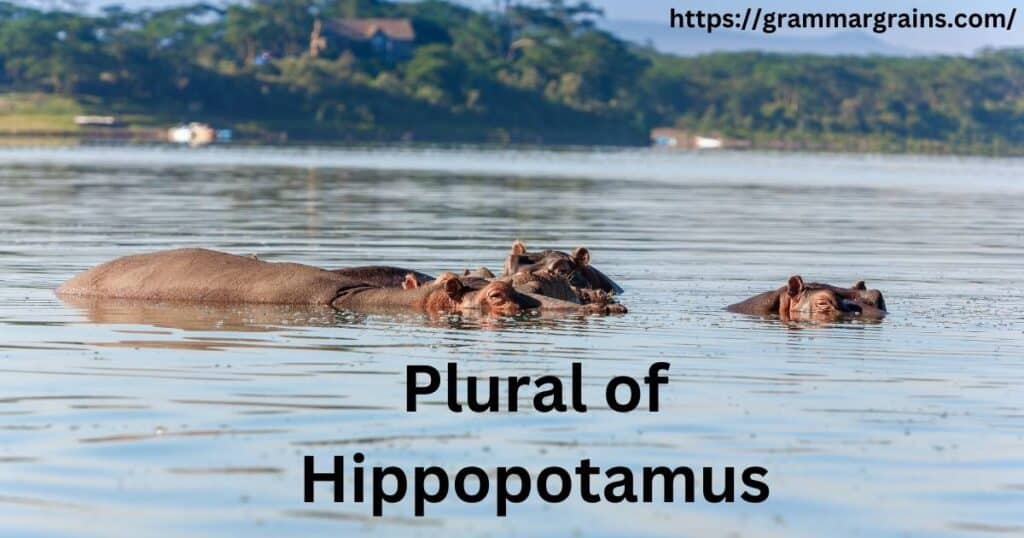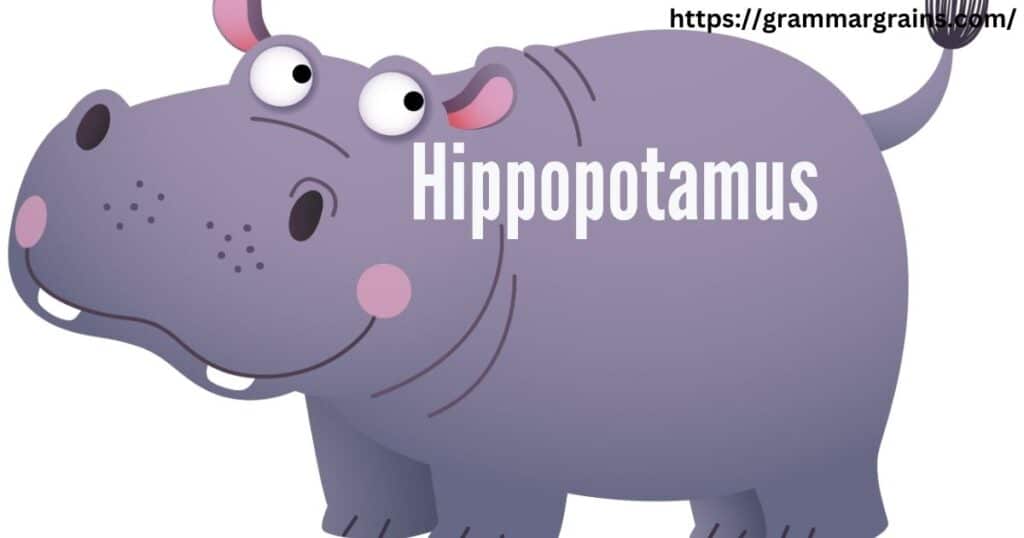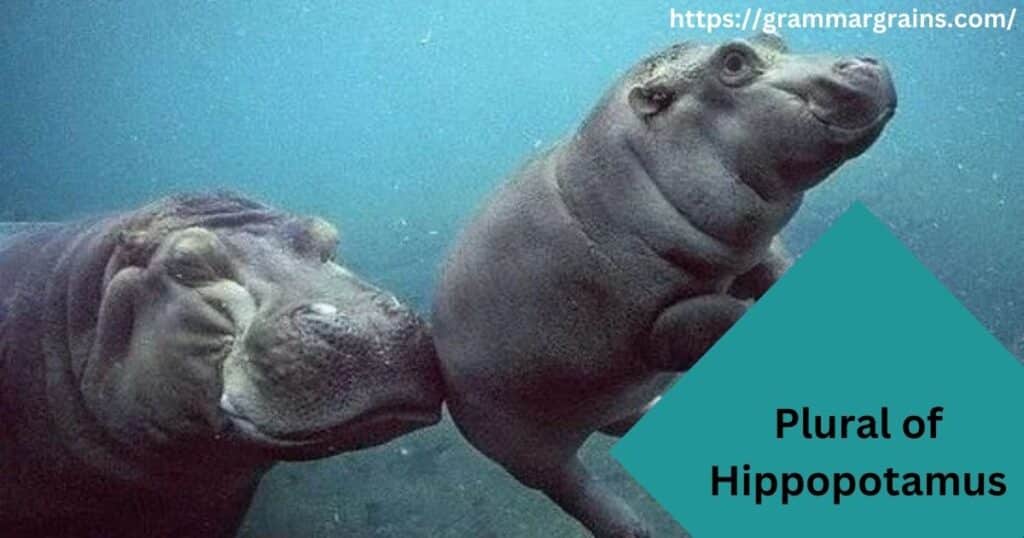The word hippopotamus has multiple plural forms, reflecting its rich linguistic history. In English, the standard plural is hippopotamuses, formed by adding “-es” to words ending in “-us.”
However, due to its Latin roots, the plural hippopotami is also widely accepted, particularly in formal or scientific contexts.
Additionally, the informal term hippos is commonly used in everyday language to refer to multiple hippopotamuses.
Understanding the Plural of Hippopotamus

This linguistic flexibility makes the word fascinating and highlights the interplay between formal and informal usage in English.
The debate surrounding the plural forms of hippopotamus is not merely about grammar.It also reflects the evolution of the English language, which borrows from multiple linguistic traditions. While hippopotamuses fits with English rules, hippopotami connects to the word’s Latin origins.
Together, they illustrate how words adapt to cultural and historical influences, creating layers of meaning and nuance.
The Curious Case of the Hippopotamus Plural

The existence of multiple plural forms for hippopotamus demonstrates the dynamic nature of English grammar.
Words borrowed from Latin, like “hippopotamus,” often retain their classical pluralization.
This is why hippopotami exists, following the Latin second declension noun pattern, where “-us” becomes “-i” in the plural.
However, English also simplifies rules, forming plurals by adding “es,” leading to hippopotamuses.
Both are correct, but they serve different purposes based on context.
Informal usage adds another layer to this discussion.
The term hippos, a casual shorthand, has gained widespread popularity for its simplicity.
It’s often used in casual conversations, social media, and even children’s books.
This reflects how language adapts to communication needs, allowing speakers to choose the form that best suits their audience.
What is a hippopotamus?

A hippopotamus is one of Earth’s most remarkable mammals.
Its name comes from the Greek words “hippos,” meaning horse, and “potamos,” meaning river, translating to “river horse.”
Despite this name, hippos are more closely related to whales and dolphins than to horses.
These massive creatures are semi-aquatic and thrive in rivers, lakes, and wetlands, where they spend most of their time submerged to stay cool.
Hippos are among the largest land mammals, with adults weighing between 1,500 to 3,200 kilograms.
They are herbivores, grazing on grasses during the night. However, their physical appearance and behavior make them formidable.
They are highly territorial and can be aggressive when threatened, especially in water.
Their size, combined with their powerful jaws, makes them a dominant force in their habitats.
What is a Hippo’s scientific Name?

The scientific name of the common hippopotamus is Hippopotamus amphibius.
This name reflects its amphibious nature, as these animals are equally at home in water and on land. A lesser-known species, the pygmy hippopotamus, is scientifically classified as Choeropsis liberiensis. This smaller relative lives in forested swamps and is much more elusive than the common hippo.
Scientific names are essential in conservation and research.
They ensure precise communication among scientists worldwide, helping to distinguish between species and study their behaviors.
The two species share some traits but differ significantly in size, habitat, and social structure, making their distinction crucial in ecological studies and preservation efforts.
Plural of Hippopotamus

Exploring Its Forms
The plural of hippopotamus comes in three main forms: hippopotamuses, hippopotami, and hippos.
Each has its own linguistic and cultural significance.
Hippopotamuses aligns with standard English grammar rules, adding “-es” to create the plural.
Hippopotami, on the other hand, follows Latin conventions, making it the choice for formal or academic contexts.
Meanwhile, hippos serves as a convenient informal term.
| Plural Form | Origin | Usage |
|---|---|---|
| Hippopotamuses | English grammar | Casual writing and conversations |
| Hippopotami | Latin derivation | Academic or historical contexts |
| Hippos | Informal shorthand | Modern, everyday use |
The flexibility in choosing the plural form makes it essential to consider your audience.
For instance, hippopotamuses might suit general writing, while hippopotami could add sophistication to scholarly discussions.
Hippos keeps things light and informal, making it perfect for everyday speech.
Fun Facts About Hippopotamuses
Hippos are truly fascinating animals.
Despite being herbivores, they are considered one of the most dangerous creatures in Africa. They can run at speeds of up to 30 km/h and have a bite force exceeding 1,800 psi, capable of crushing bone. Their skin secretes a unique red fluid, often referred to as “blood sweat,” which acts as a natural sunscreen and prevents infections.
Socially, hippos live in groups called “bloats,” which can include up to 30 members.
These groups are usually led by a dominant male who fiercely defends his territory.
Hippos also play a critical role in their ecosystems, as their grazing and movements contribute to nutrient cycling in rivers and wetlands.
Their behavior and ecological impact make them cornerstone species in their habitats.
Hippopotamus Behavior and Conservation

Hippos are nocturnal feeders, emerging from water at night to graze.
They can consume up to 88 pounds of grass in one feeding session.
Although they are semi-aquatic, they don’t swim like most aquatic animals.
Instead, they walk or bounce along the riverbed.
Their territorial nature often leads to conflicts with other animals, and they have been known to attack boats and intruders who get too close.
Conservation efforts are critical for hippos, as their populations face severe threats. Poaching for their ivory-like teeth and habitat destruction from agriculture and urbanization have caused significant declines in their numbers. Organizations are working to create protected areas and reduce human-wildlife conflict.
These efforts aim to safeguard not only the hippos but also the ecosystems they support.
Hippo Talk and Cultural Impact
Hippos have left a significant mark on culture and language.
Their name, derived from Greek, connects them to ancient civilizations.
Today, they are featured in literature, films, and songs.
The classic Christmas tune “I Want a Hippopotamus for Christmas” showcases their enduring charm.
In the digital age, the plural of hippopotamus continues to spark debates on forums and social media.
People often discuss whether hippopotamuses or hippopotami is more appropriate.
This debate reflects not just grammatical curiosity but also a deeper connection to language.
The popularity of hippos in casual conversation further illustrates how language evolves to meet practical needs.
Conclusion
The plural forms of hippopotamus—hippopotamuses, hippopotami, and hippos—are a testament to the richness of the English language. Each form has its own unique place, whether in formal writing, casual conversation, or scientific discourse. The coexistence of these forms highlights the adaptability of language and its ability to reflect cultural and historical influences.
Ultimately, the choice of plural depends on the context and audience. The variety of options allows for creativity and precision, making the word “hippopotamus” a perfect example of linguistic diversity. Understanding its forms not only enriches our vocabulary but also deepens our appreciation for the dynamic nature of language.
FAQs
What is the plural of hippopotamus?
Both hippopotamuses and hippopotami are correct; hippos is informal.
Where do hippos live?
Hippos live in rivers, lakes, and wetlands across sub-Saharan Africa.
Are hippos endangered?
Common hippos are vulnerable, and pygmy hippos are endangered.
What do hippos eat?
Hippos are herbivores and primarily graze on grass.

Taila Lucy, an expert content writer at Grammar Grains, brings 4 years of experience crafting engaging pieces on grammar. Her work delves into synonyms, antonyms, slang, puns, and poetry, helping readers master English with creativity and flair.






